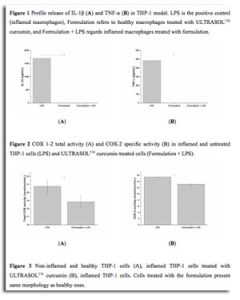 Title
Title
Is ULTRASOL™ Curcumin able to effectively treat prostatic inflammation? An in vitro study to assess bio-availability and anti-inflammatory activity of a new curcumin formulation.
Running Title
ULTRASOL™ Curcumin for the treatment of prostatic inflammation
Authors’ name and degrees
Angelo Naselli§, Erik Tedescoǂ, Federico Benettiǂ, Paolo Puppo*
§Urology Department, Ospedale San Giuseppe, Gruppo Multimedica, Milan, Italy
*Urology Department, Istituti Clinici di Pavia e Vigevano – Gruppo San Donato, Pavia, Italy
ǂECSIN-European Center for the Sustainable Impact of Nanotechnology, ECAMRICERT SRL, Rovigo, Italy
Corresponding Author
Dr Angelo Naselli
Address: Via San Vittore 12, 20123 Milano, Italy
Telephone: 0285994751
E-mail: angelo.naselli@auro.it
Acknowledgements
The research was founded by an unrestricted grant by Gowell SRL
Abstract
Background
Prostate inflammation is linked to benign prostatic hyperplasia and its progression. Curcumin has been recognized as an effective anti-inflammatory agent. Our aim was to assess bio-accessibility, bio-availability and anti-inflammatory activity at both systemic and prostate specific level of curcuminoids contained in a new oral curcumin-base formulation, ULTRASOL™ curcumin.
Methods
Following digestion with an in vitro model of the digestive process, ULTRASOL™ curcumin anti-inflammatory activity was firstly assessed at bio-accessible concentration on an in vitro model of systemic (monocytic/macrophage THP-1) and prostate specific (androgen-sensitive human prostate adenocarcinoma LNCaP cells) inflammation. The levels of pro-inflammatory cytokines (IL-1β and TNF-α) released in culture medium and cyclo-oxygenases (COX) 1 and 2 were assessed in presence or absence of the formulation. Once confirmed the systemic and prostate specific anti-inflammatory activity of ULTRASOL™ curcumin bio-accessible fraction, curcuminoids bio-availability was assessed with an in vitro model of human intestinal epithelium, based on human adenocarcinoma-derived intestinal cells (Caco-2). Finally, the bio-available fraction ability to reduce inflammation at both systemic and prostatic levels was tested on the same in vitro models employed for the bio-accessible fraction.
Results
At bio-accessible concentration, ULTRASOL™ curcumin suppressed the release of pro-inflammatory cytokines (IL-1β and TNF-α) and significantly reduced total COX and COX-2 specific activity in both inflamed systemic and prostate models, while a significant decrease of pro-inflammatory cytokines release and cyclo-oxigenases activity was observed following treatment with bio-available concentration of curcuminoids. Bioavailability of curcuminoids was expressed as 1) absorption fraction = 0.18 ± 0.05 2) bio-available/mg active principle = 1.8 μg 3) apparent permeability – Papp 3.9 · 10-7 cm/s. Finally, no adverse effect on viability and barrier properties of the intestinal epithelium was evidenced.
Conclusion
ULTRASOL™ curcumin formulation did not induce any adverse effect on viability and barrier properties of the intestinal epithelium in vitro model, underlining its safety for oral administration. The bio-accessible fraction of the ULTRASOL™ curcumin formulation decreased both systemic and prostate-specific inflammation. Similar results were obtained with a single dose of bio-available (absorbed) fraction of ULTRASOL™ curcumin confirming its prospective role in the treatment of prostatic inflammation.
Keywords
prostate, inflammation, lower urinary tract symptoms, curcumin